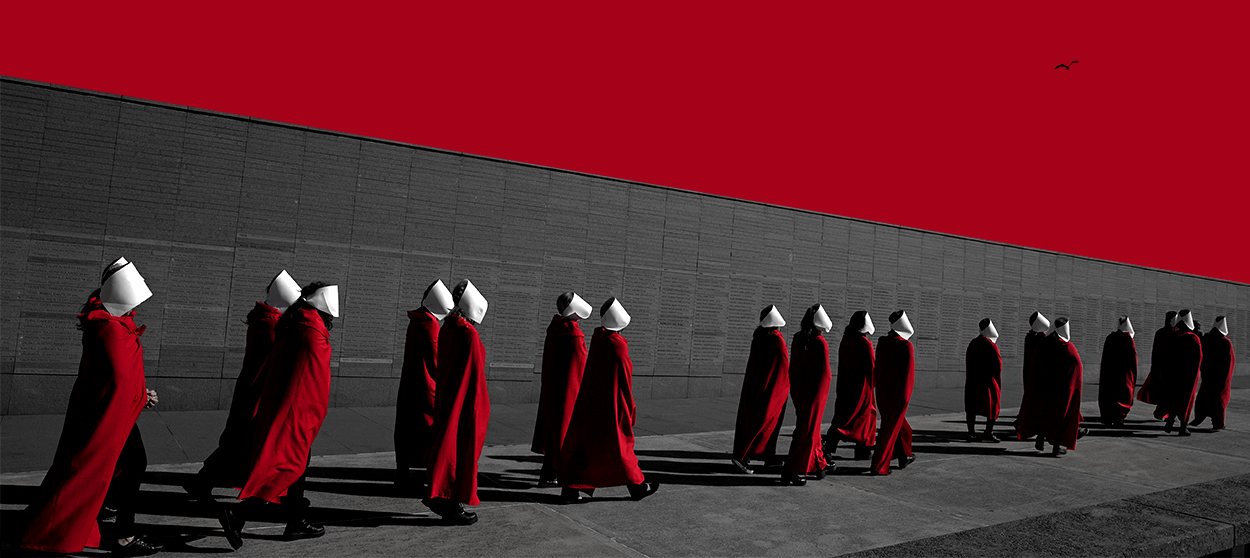What white women are getting wrong about the abortion debate
If you're marching around in a red handmaid's robe, you're missing the point


A free daily email with the biggest news stories of the day – and the best features from TheWeek.com
You are now subscribed
Your newsletter sign-up was successful
Women's reproductive rights are under attack in America. More than a dozen states have recently attempted to pass strict anti-abortion laws, and this month, two bills catapulted the anti-choice movement to a whole new level. In early May, Georgia voted to restrict abortion access to the first six weeks of pregnancy, a time when many women don't even know they are pregnant yet. Under this bill, getting or performing an abortion is punishable by up to 10 years in prison. A week later, Alabama passed legislation that not only criminalizes all abortion with no exceptions for rape or incest, but would seek to penalize abortion providers with up to 99 years in prison.
The response from pro-choice advocates has been loud and angry. They've taken to the streets in protest, often enrobed in the iconic red cloaks donned by characters in The Handmaid's Tale, Margaret Atwood's dystopian novel (and now popular Hulu series) set in an America overtaken by Christian extremists and renamed Gilead.
In a way, invoking the image of the Handmaid to raise alarm over disappearing reproductive rights makes sense. In Atwood's novel, many women live under intense levels of oppression, and their bodies are never their own. Fertile women are forced into the role of Handmaids and regularly raped by high-ranking husbands and forced to give birth on behalf of their infertile wives. But one of the things that makes Atwood's novel unequivocally fiction is its whiteness. In the real world, it is young women of color who will be affected most by these new laws. And cis white women responding to the legislation by donning Handmaid's robes and warning of a dystopian future is not only melodramatic and ineffective, it's also dismissive of the real harm that is happening here and now.
The Week
Escape your echo chamber. Get the facts behind the news, plus analysis from multiple perspectives.

Sign up for The Week's Free Newsletters
From our morning news briefing to a weekly Good News Newsletter, get the best of The Week delivered directly to your inbox.
From our morning news briefing to a weekly Good News Newsletter, get the best of The Week delivered directly to your inbox.
Though the Hulu adaptation of The Handmaid's Tale has recast precious little diversity into the story, the book itself is unapologetically white. Laura Hudson summarizes the novel's race problem at Vulture:
We're told that black people — who are called "the children of Ham," after one of Noah's sons who is often construed as black — were removed from society and resettled in "the National Homelands," an undisclosed place somewhere in the Midwest. [Laura Hudson, Vulture]
So, in the book, it's white women whose reproductive rights are stripped, and whose bodily autonomy is hijacked. But reality, of course, looks very different. Black mothers are three to four times more likely to die in childbirth than white mothers. Historically, black women have been subjected to unnecessary hysterectomies and were treated as guinea pigs when modern gynecology was invented.
In other words, black women have already lived the horrors of The Handmaid's Tale.
And they continue to do so today. In states where abortion rights are toughest, it is poor women of color who lose their autonomy. In Alabama, a state where 68 percent of women are white, a staggering 65 percent of all women seeking abortions are non-white. And across the U.S. as a whole, 75 percent of women seeking abortions are poor. The abortion rate for black women in America is nearly three times that for white women. As the Guttmacher Institute explains, the reason for the disparity boils down to a lack of easy access to affordable health care and birth control, as well as deep-seated racism. And as new laws make abortions harder to access, women who have the time and money to travel across state lines will do so. "They're going to find another state, find another country," said Democratic Alabama Sen. Linda Coleman-Madison. "People are going to have abortions. The problem is, it's going to always be unsafe, inaccessible for those people who have lesser means."
A free daily email with the biggest news stories of the day – and the best features from TheWeek.com
Indeed, privilege often exempts white women from many of the injustices imposed upon those who are poor or black or trans or otherwise marginalized. This is perhaps why most middle-class cis white women haven't fought harder for (or, in some cases, have actively fought against) protections that ensure comprehensive reproductive health: A lot of the time, it simply doesn't affect us. Many of us are able to get out, to get care, to get support in the face of an unplanned pregnancy.
So we've become complicit. We've become part of the problem. Don't forget that more than half of white women — 53 percent — voted Republican in the 2016 presidential election. Alabama's anti-abortion law was written by a white woman, Rep. Terri Collins (R-Ala.) and signed into law by a white female governor, Kay Ivey. They are just some of the white women turning a blind eye to ongoing human rights violations.
It's true that some white women would suffer under these new laws, but by and large, this is not our story. It's time we shift the focus away from our own narratives, and start acting on behalf of those most at risk. We need to stop marching around in red robes and fretting about a dystopian future where horrible things might happen to us and recognize that those horrible things are happening right now to women of color, and that we have had a hand in the blame.
Gemma Hartley is a full-time freelance writer living in Reno, NV. Her work has appeared in The Washington Post, CNBC, Glamour, Women's Health, Redbook Magazine, and more.
-
 6 exquisite homes with vast acreage
6 exquisite homes with vast acreageFeature Featuring an off-the-grid contemporary home in New Mexico and lakefront farmhouse in Massachusetts
-
 Film reviews: ‘Wuthering Heights,’ ‘Good Luck, Have Fun, Don’t Die,’ and ‘Sirat’
Film reviews: ‘Wuthering Heights,’ ‘Good Luck, Have Fun, Don’t Die,’ and ‘Sirat’Feature An inconvenient love torments a would-be couple, a gonzo time traveler seeks to save humanity from AI, and a father’s desperate search goes deeply sideways
-
 Political cartoons for February 16
Political cartoons for February 16Cartoons Monday’s political cartoons include President's Day, a valentine from the Epstein files, and more
